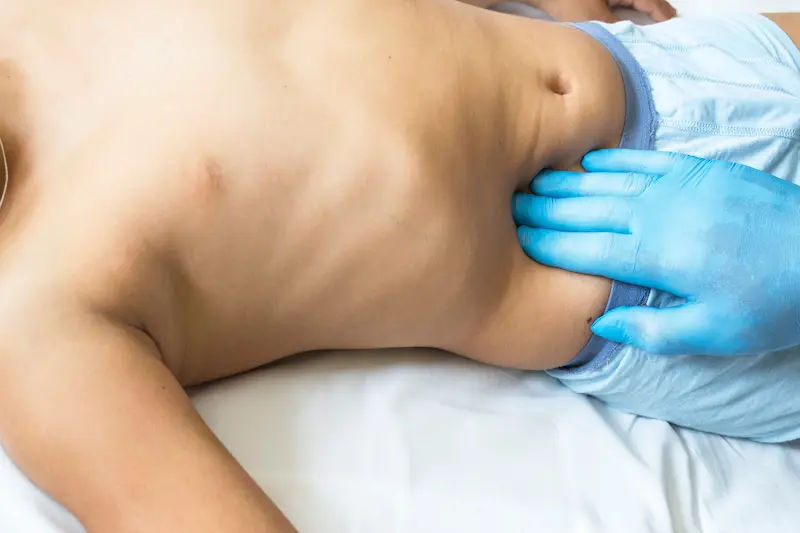Appendicitis Surgical Emergency Timing
Understand the importance of appendicitis surgical emergency timing by knowing about its symptoms, diagnosis, and treatment options. Learn why quick medical attention can help improve outcomes in appendicitis cases.

Written by Dr Sonia Bhatt
Last updated on 3rd Jul, 2025
Appendicitis is a serious condition that needs fast attention. It happens when the appendix, a small pouch connected to the large intestine, becomes swollen and inflamed. If not treated right away, it can lead to major problems like a burst appendix, which can be life-threatening.
Surgery is usually the only way to fix it. Therefore, the faster it’s done, the better the outcome. Ignoring the signs can quickly turn a manageable problem into a dangerous emergency.
This guide will help spot the symptoms and understand the steps needed for timely intervention.
Understanding Appendicitis
Appendicitis doesn’t come with a warning. It can strike suddenly, so understanding its causes and severity is essential.
The development of appendicitis typically begins with inflammation and infection of the appendix. This condition can progress rapidly, making early intervention essential for successful treatment. Several factors may contribute to its development:
The most common causes include:
Blockage by faecal matter or foreign objects
Enlarged lymphoid follicles, which can occur during viral infections
Inflammatory bowel disease affecting the digestive tract
Trauma to the abdomen, though this is less common
While understanding the common causes of appendicitis is essential to treat it at the right time, knowing potential risk factors further helps prevent it at a comparatively earlier stage.
Some of the risk factors include:
Most common between people within the age bracket of 10-30
Having a family history of appendicitis
Having a low-fibre diet
More common in men
Appendicitis can range from mild inflammation to severe complications. A non-complicated case involves just inflammation. But if untreated, it can progress to rupture, leading to a dangerous infection called peritonitis. Complicated cases, such as those with abscess formation, require urgent and advanced care.
Symptoms of Appendicitis
Early warning signs of appendicitis often include:
Pain that begins near the navel and gradually shifts to the lower right abdomen
Loss of appetite, which usually occurs before other symptoms
Nausea and vomiting that typically follow the onset of pain
Low-grade fever between 37.2°C and 38.3°C
As the condition progresses, more serious symptoms may develop:
Severe abdominal pain that worsens with movement
High fever above 38.3°C, indicating increased inflammation
Rigid abdominal muscles, a protective response to inflammation
Increased heart rate, often accompanied by sweating
Mental changes such as confusion or lethargy
Progressive symptoms, as such, demand immediate medical assistance since delaying treatment could lead to complications such as a ruptured appendix.
Consult Top Surgeon For Appendicitis
Diagnosis of Appendicitis
Medical professionals employ a comprehensive approach to diagnosing appendicitis, combining physical examination with various diagnostic tools. This systematic evaluation helps ensure accurate diagnosis and appropriate treatment timing.
The physical examination typically involves a thorough assessment of abdominal tenderness, particularly in the right lower quadrant, where the appendix is located. Healthcare providers usually evaluate:
Specific points of tenderness
Muscle rigidity and guarding
Response to gentle pressure release (rebound tenderness)
Overall vital signs and general health status
Advanced diagnostic tools may include modern medical imaging and laboratory tests that play a crucial role in confirming the diagnosis. Some other diagnostic tests include:
Blood tests help identify infection markers and inflammation
Urinalysis rules out other conditions like urinary tract infections
CT scans provide detailed images of the appendix and surrounding tissues
Ultrasound imaging offers a safer option for children and pregnant women
Consult Top General Surgeon
Surgical Intervention Options
When it comes to treating appendicitis, modern surgical techniques offer different approaches based on individual patient needs. Understanding these options helps patients and families feel more informed about the surgical process.
The most common surgical procedure is an appendectomy, which can be performed in two main ways:
Laparoscopic Surgery
Often called keyhole surgery, this modern technique uses small incisions and special instruments:
Requires only 3-4 tiny cuts in the abdomen
Uses a small camera to guide the surgeon
Typically results in less post-operative pain
Allows most patients to return home within 24 hours
Leaves minimal scarring
Traditional Open Surgery
This method is often the preferred choice in complex cases, such as when the appendix has ruptured, or there is a widespread infection in the abdominal cavity.
Involves a single larger incision
Provides surgeons with direct access to the appendix
May be necessary for severe infections
Often preferred when the appendix has already ruptured
Allows better handling of complications
Appendectomy is highly effective when it comes to treating appendicitis, but like any procedure, it comes with risks such as infection or bleeding. Anaesthesia-related complications are also possible, though rare. The benefits, including relief from pain and prevention of rupture, far outweigh the risks, especially in emergency situations. Discussing these factors with the surgeon ensures an informed decision.
Critical Timing Considerations
The timing of appendix surgery plays a crucial role in recovery outcomes. Think of appendicitis like a ticking clock—the sooner it's addressed, the better the results typically are.
Several key factors influence when surgery should take place:
Patient-Related Factors
These include:
How long symptoms have been present
The severity of inflammation
Overall health condition
Age and medical history
Hospital Considerations
The surgical team carefully evaluates:
Emergency department capacity
Operating theatre availability
Surgical team readiness
Required pre-operative preparation time
Consequences of Delayed Surgery
A delayed operation increases the risk of rupture. Once the appendix bursts, bacteria spread into the abdomen, causing infections that are harder to treat. This can lead to inflammation or abscess formation, which complicates recovery and increases the length of hospital stays. In some cases, delay can even result in sepsis, a life-threatening condition.
Post-Surgical Care and Recovery
Recovery after appendix surgery follows a well-planned path, designed to help patients return to their normal activities safely and comfortably.
The initial recovery phase includes immediate care in the hospital and focuses on comfort and monitoring:
Pain management using appropriate medications
Careful monitoring of vital signs
Gradual introduction of fluids and food
Early movement to prevent complications
Long-term recovery involves a structured approach to returning to normal activities:
Regular check-ups to ensure proper healing
Gradual increase in physical activity
Return to work or school planning
Dietary adjustments as needed
Complications Associated with Delayed Surgery
While most appendix surgeries proceed smoothly, it's important to understand possible complications, especially when surgery is delayed.
Serious Complications
Early intervention helps avoid these major concerns:
Appendix rupture, which can spread infection
Peritonitis—an infection of the abdominal lining
Abscess formation requiring additional treatment
Systemic infection affecting the whole body
Secondary Issues
Delayed treatment might lead to:
Extended hospital stays beyond the usual 1-3 days
Slower return to normal activities
Higher risk of wound healing problems
Increased recovery time and medical costs
Prevention and Early Detection
While appendicitis itself can't be prevented, understanding when to seek help makes a significant difference in treatment outcomes. Being prepared helps ensure timely treatment. Therefore, here are some ways you can detect and prevent grave outcomes:
Read up more about the early warning signs
Understand when abdominal pain requires medical attention
Recognise the progression of symptoms
Don't delay seeking medical help when concerned
Conclusion
The successful treatment of appendicitis relies heavily on recognising symptoms early and seeking prompt medical attention. Modern surgical techniques, combined with appropriate timing and proper post-operative care, provide excellent outcomes for most patients.
Understanding the importance of quick action when appendicitis is suspected can make the difference between a straightforward recovery and potentially serious complications
Consult Top General Surgeon
Consult Top Surgeon For Appendicitis

Dr. Deepak Thakur
General Surgeon
10 Years • MBBS, MS General Surgery
Patna
Health Care Clinic, Patna
Dr. Deepak G
General Surgeon
2 Years • MBBS, MS
Bengaluru
A.V.S Clinic, Bengaluru

Dr Anubhav Chittari
General Surgeon
3 Years • MBBS, M.S GENERAL SURGERY
Bengaluru
PRESTIGE SHANTHINIKETAN - SOCIETY CLINIC, Bengaluru

Dr Venu Kumar K N
Vascular Surgeon
8 Years • MBBS, MS(General Surgery),M ch(Vascular Surgery) DrNB
Bengaluru
Apollo Clinic, JP nagar, Bengaluru
Dr. Siva Prasad Arja
General Surgeon
4 Years • MBBS, DNB (GENERAL SURGERY)
Hyderabad
Seasons hospital, Hyderabad
Consult Top General Surgeon

Dr. Deepak Thakur
General Surgeon
10 Years • MBBS, MS General Surgery
Patna
Health Care Clinic, Patna
Dr. Deepak G
General Surgeon
2 Years • MBBS, MS
Bengaluru
A.V.S Clinic, Bengaluru

Dr Anubhav Chittari
General Surgeon
3 Years • MBBS, M.S GENERAL SURGERY
Bengaluru
PRESTIGE SHANTHINIKETAN - SOCIETY CLINIC, Bengaluru

Dr Venu Kumar K N
Vascular Surgeon
8 Years • MBBS, MS(General Surgery),M ch(Vascular Surgery) DrNB
Bengaluru
Apollo Clinic, JP nagar, Bengaluru
Dr. Siva Prasad Arja
General Surgeon
4 Years • MBBS, DNB (GENERAL SURGERY)
Hyderabad
Seasons hospital, Hyderabad



.webp)